History of Nursing Symposium 2019
History of Nursing Symposium 2019
100 Years of University Nursing Education at UBC
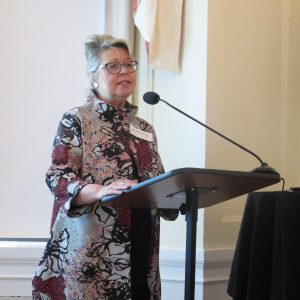 Keynote speaker Dr Susan Duncan, Professor and Director, School of Nursing, UVic |
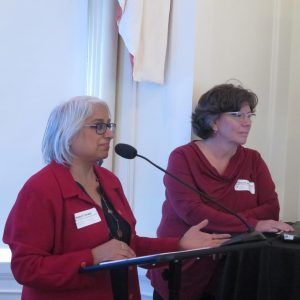 Ranjit Dhari and Frances Affleck present on “Wellness Wednesdays.” |
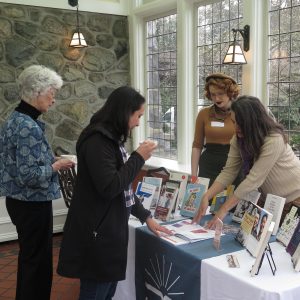 Guests visit displays including a book table staffed by UBC Press. |
Looking Back and Looking Forward
“Do you think we can rest satisfied with what we have? It is good, yes, but not good enough. Now what are we nurses going to do about it?” This is the question posed in 1919 by UBC School of Nursing’s first Director Ethel Johns in an address to staff and pupils at Vancouver General Hospital. Dr Susan Duncan, Professor and Director at the University of Victoria School of Nursing, offered this quote in the conclusion of her keynote address and it resonated throughout the daylong History Symposium that the School’s Consortium for Nursing History Inquiry convened on March 14, 2019. Sixty participants sought to “look back and look forward” at the 100 years of university nursing education at UBC in the delightful setting of UBC’s Cecil Green Park House.
UBC alumna Dr Duncan opened the symposium with some critical reflections on the legacy of Ethel Johns and other leaders of nursing education and with the conviction that history may enlighten current issues and debates in public health nursing. As the themes of knowledge, leadership, and social accountability that have historically shaped the nursing curriculum continue to resound with nursing education today, Dr Duncan called for a more vocal advocacy in favour of the BSN program and for the voice of nurses to be stronger in media. Increasingly moving towards social justice-oriented education and practices, drawing on feminist and postcolonial critical perspectives, and learning from Indigenous perspectives may be steps to include in defining a common agenda for Canadian nurses in the twenty-first century.
In the panel that followed, a number of former and current faculty members shared their experiences and reflections about nursing knowledge and practice. Professor Emerita Dr Joan Anderson discussed the culture of scholarship in the 1980s. She showed how both qualitative and quantitative paradigms developed into legitimate methods of scientific inquiry. Drawing on life stories, obtained through ethnographic research, she sought to better understand the social determinants of health and how the sociocultural context shapes the context of suffering. These new theoretical developments were a response to a new immigration and multicultural context and to a shared conviction about the need to provide equitable health care to everyone. This philosophy also informed the theorization of UBC Model of Nursing, which was the subject of Dr Geertje Boschma’s presentation. In her comments, Dr Boschma developed the context within which nursing laid claim to the cultural rules governing science, research, and theory development, and highlighted the need not only to understand the “what” of behaviours, but also the “how,” as well as the essential subjective meaning humans attach to critical periods of their lives.
The next presentation took up this theme and expanded on learning from clients’ lived experiences and resilience in a description of Wellness Wednesdays. This initiative was developed within the context of the Primary Health Care Course. In their presentation, UBC Clinical Associate Frances Affleck and UBC Instructor Ranjit Dhari showed how this innovative program offers students an opportunity to provide general health information to underprivileged communities. “It helped me to humanize these communities we learn about theoretically,” one of the BSN students explained.
Students were at the heart of the workday experiences of Marion Clauson, Senior Instructor Emerita and nurse educator for almost 40 years. She offered her perspectives on the evolution of nursing education from the 1970s to the present, expanding on her involvements in hospital, college, and university-based programs. She recounted how developments in clinical learning helped her become a “guide on the side rather than the sage on the stage for students.” The development of distance and online learning further fostered this learner-centred approach in Canadian nursing education. Sheila J. Rankin Zerr, who was involved in teaching complete computer-based courses at UBC in the 1990s, and PhD Candidate Catherine Haney reviewed these pedagogical strategies in a stirring presentation. Sheila recounted how she shared the development of a comprehensive national television teaching and learning initiative from the 1980s, while Catherine reflected on the student-centred and multisensorial aspect of these developments.
Passion was a recurring theme on everyone’s lips, and it is indeed with a renewed enthusiasm and determination that our panelists and guests will continue crafting a plan for today and tomorrow’s nursing education.
Nicolas El Haïk-Wagner
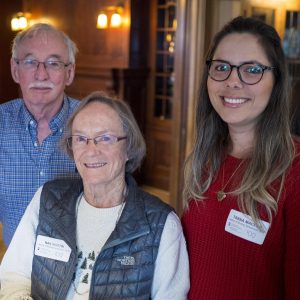 Nursing archivists Francis Mansbridge and Nan Martin chat with Tassia Teles S. de Macedo, PhD Student (UVic). |
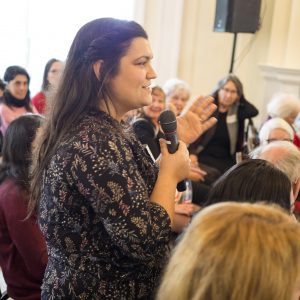 Dawn Tisdale has a question for the keynote speaker. |